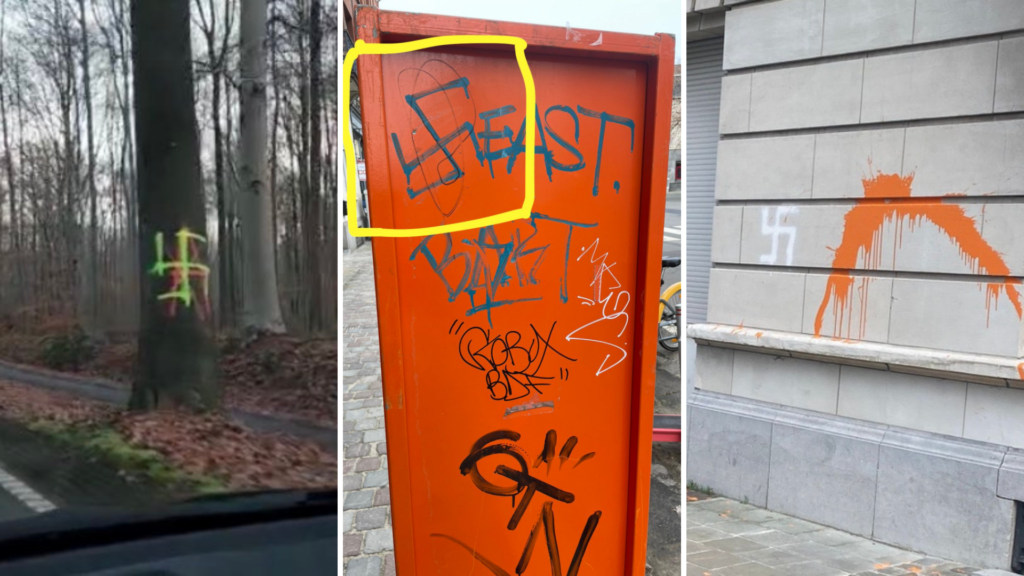From swastikas on trees to a personalised licence plate with a reference common in neo-Nazi circles on the streets of Brussels, a visual anti-Semitism seems to be taking place in the Belgian capital.
On the International Holocaust Remembrance Day at the end of last month, the Israeli ambassador to Brussels Idit Rosenzweig-Abu shared a video on Twitter of her driving through the region's largest green space, Bois de la Cambre.
In the video, she passes a tree daubed with a fluorescent yellow swastika, an ancient symbol used in many cultures that were adopted by Adolf Hitler and turned into a symbol of hatred. This week, the same symbol appeared on two buildings in Ixelles, where it also appeared on a traffic sign in January.
Earlier this week, a Mercedes jeep with the license plate 'HH-88', commonly known to refer to 'Heil Hitler' and commonly used in neo-Nazi circles. While Unia, the centre for equal opportunities, told Bruzz it has been aware of its existence for several years and has already received a dozen complaints about it, removing a license plate that is in circulation is complex.
'Never went away'
In 2020, Unia already noted that anti-Semitism is "far from gone today," pointing to the previous annual report which showed that the rise of anti-Semitism in Europe in recent years has been alarming and that Belgium is not escaping the trend.
"In addition to verbal aggression, physical aggression and intimidation, Unia also notes more damage to property and the use of symbols."
The latest annual report published by antisemitism.be, which records every incident reported to the police, confirmed the continuation of this trend, showing that in 2021, the largest number of acts of anti-Semitism was recorded since the census began in 2001. Most of the offline incidents took place in Antwerp and Brussels.
It noted that the rise in figures can be explained in part by the "Guardian of the Walls" operation between Israel and Hamas in May 2021. "The Middle East conflict is regularly co-opted to express anti-Semitism under the guise of anti-Zionism," the report read.
"There is something to be said about the fact that people do not always make the difference between the policies of the state of Israel and Judaism," said the director of the Hannah Arendt Institute, Christophe Busch.
However, it also noted that the pandemic has "exacerbated frustrations and fears of all kinds," adding that Jews are "regularly targeted and held responsible for the disease or profiting from it." Finally, Russia’s invasion of Ukraine has further aggravated the trend, with disinformation and hatred against Jews “flourishing” online.
Related News
- Despite previous racism controversies, Aalst Carnival participants don blackface
- Spanish MEP denied entrance to Israel on parliamentary visit
Busch said there is no question that anti-Semitism is on the rise, adding that swastikas and other neo-nazi symbols popping up in various places are exponents of a growth scenario and signs of the "mainstreaming" of "toxic frames" which he has long warned against.
"You often see that forms of extremist thinking experience a boost due to events that have a heavy impact on society or new forms of information and communication technology," Busch said, adding that he fears that the number of swastikas in public will only increase.

